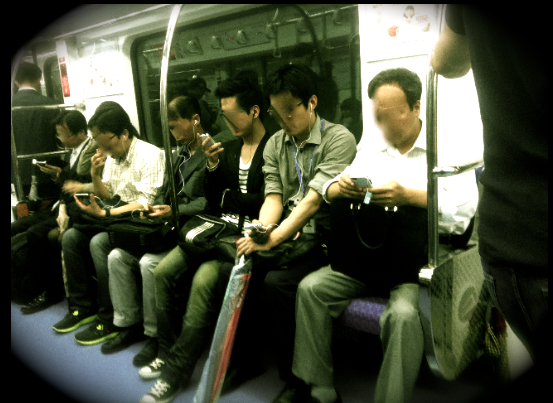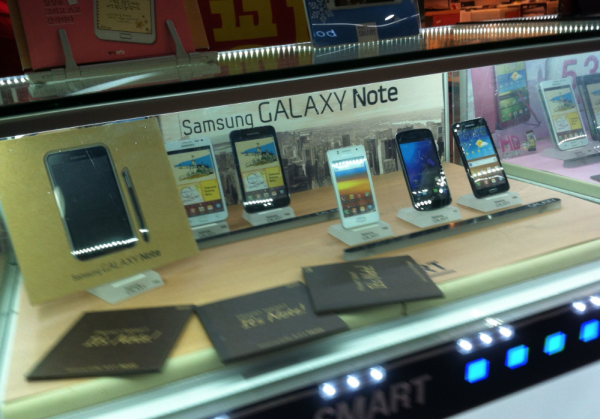Former Lycos CEO, Jungwook Lim (@Estima7) describes his experience witnessing the changes in Korean society through the use of smartphones.
After moving to Boston in March 2009 I came back to Korea around 2-3 times a year. Usually I would visit Seoul around once every six months and every time I would be little more surprised at the transformations taking place.
But since my last visit about six months ago in December, I was very surprised by the “smartphone wave”. With my recent business trips to major cities around the globe in the US, Japan, Europe and Israel, I feel that Seoul must have one of the propagation rates and ratios for smartphones in the world. It might be a reflection of Koreans’ tendency to go “all-out” once focused on something.

Firstly, everyone on the subway and public transport is starting at their smartphones. Once every now and again someone will be reading a book or a newspaper — but everyone else is doing something on their phone. As @coolpint once said, those holding the screen horizontally are watching TV (or downloaded video) and those holding their phones vertically are usually using Kakao Talk. It’s hard to see this many people using smartphones in Boston, New York or San Francisco, but this is because the internet does not work underground in those places. Korea’s excellent underground internet access seems to be the perfect element for smartphones.
Another point is that unlike the United States, there is a strong trend of Samsung Android phones. In the US, it’s easy to spot iPhones and I would say that in a public place, 3 in 7 phones would be an iPhone. This seems to have increased particularly since the release of the iPhone 4S. However, in Seoul there appears to be a lot of Android phones and I was especially surprised at the amount of Galaxy Note phones I saw. It seems that the Galaxy Note has found a safe place in the Korean market. Even personally I think that the Note had been made well, and what I once used to think looked like an iron, is starting to look okay after seeing it so often.

I don’t remember seeing anyone in the US using the Galaxy Note but as soon as I arrived back in Boston my neighbor who is also Korean was happy with his new Note that he had bought. He said that sometimes he sees others in the US using them too, which makes me wonder how far the Galaxy Note will be able to penetrate overseas markets in the future. One venture CEO who is developing an iPhone app said, “If you go to the provinces you can barely see iPhones and most smartphones are Android phones. This is because Android phones are offered at a discount prices which make the phone almost free.” It made me think that it’s almost enough for the maker of Android, Google’s Andy Rubin to be flattered by Korea’s uptake of the operating system.
In the weekend while walking from the city hall plaza to Myeongdong, I looked around closely and it felt like most people were using Smartphones. High school students were no different. Walking past a coffee shop in the lower floors of Lotte Department Store, I could see groups of students sitting around with smartphones on the table in front of them. Numerous couples looked at smartphones together while they talked. It almost made me think one could almost be seen as an outcast for not having one of the devices.
My father, who is in his 70s said to me, “Whenever friends get together these days they all look at their smartphones.” Senior citizens are no exception. My mother who still uses a standard cellphone says with a hint of disgust that she is sick of the phone calls asking her to switch to a smartphone. She says that the fees are expensive and she doesn’t need one. Nevertheless, the phone companies asking her to change are persistent in calling.
While I was sitting on the subway, an old lady warned her young granddaughter, “If you use smartphones too much you’ll become addicted.” At this rate it’s no exaggeration to say that the whole country seems infatuated with smartphones.
Early smart devices such as Blackberrys and Palmpilots gained a following in the business community during the early 2000s. Even though the iPhone was released mid-way through 2007 in the US, only now do smartphone users make up 50% of all phone users. In Korea, this number has been reached in two and a half years after the iPhone entered the market in late November 2009. Out of the 52.6 million mobile phone owners, smartphone users make up 50.8% of the market with 26.7 million users, (I think the ratio of smartphone use in Seoul alone will have surely passed 50%.) This is an extremely fast change that one cannot ignore.
If you meet people and talk to them, it seems that the frequency of attention lost to smartphones is much higher than that in the US. A while ago there was a piece written about Americans becoming smartphone addicts titled, “We are become slaves to the smartphone”. However, after visiting Korea I think that smartphone addiction could be more serious for Koreans than users in the US. This is because all ages seem to use Kakao Talk. (In the US it appears that except for the younger generation, not many people sent text messages.)
The age of having a constant connection to the internet in the palm of your hand has arrived. As this is just the beginning, what changes will happen in the future? What changes will we see in the behavioral patterns of the smartphone’s best friend, the younger generation? What effect will the integration of smartphones and social networks like Facebook, Twitter have on Korean society? What effect will this smartphone culture have on the Korean presidential election at the end of this year?
Though all of this is something that could have been predicted, after seeing this “smart” Korea for myself, I felt once more how dynamic Korean society can be. I don’t know any other society that changes so fast, whether that be for better, or worse.
[#M_ Click here to view the original Korean article | Hide | 2009년 3월 보스턴으로 이주한 이후 나는 보통 1년에 2~3번정도 한국을 잠깐씩 방문해왔다. 보통은 반년에 한번씩 서울을 방문하는 편인데 그때마다 변모하는 모습에 조금씩 놀란다.
그런데 지난해 12월이후 이뤄진 대략 6개월만의 이번 방문에서는 ‘스마트폰의 물결’에 크게 놀랐다. 최근 몇년간 미국, 일본, 유럽, 이스라엘 등의 주요 도시를 출장다닌 내 느낌으로는 서울 사람들의 스마트폰 보급속도와 보급율은 그야말로 이미 세계최고수준에 이른 것이 아닌가 싶다. 일단 한번 쏠리면 끝장을 보는 한국인의 성격이 반영된 것 같다.

7명이 앉는 지하철좌석 한칸을 유심히 봤는데 대개 4~5명이 스마트폰이나 타블렛을 들고 뭔가를 하고 있다. 거의 예외가 없을 정도였다.
우선 지하철 등 대중교통수단에서 모두 스마트폰에 머리를 박고 있다. 책이나 신문을 읽는 사람들은 가뭄에 콩나듯 있고 모두가 스마트폰으로 뭔가를 하고 있다. @coolpint님의 말씀처럼 가로로 보고 있는 사람은 TV를 보고 있는 것이고(아니면 다운로드한 동영상), 세로로 쓰고 있는 사람은 카톡을 하고 있는 경우가 많은 듯 싶다. 보스턴, 뉴욕, 샌프란시스코 등 미국의 지하철에서는 이렇게까지 스마트폰을 열심히 쓰고 있는 모습을 보기는 힘든데 그것은 지하에서 인터넷이 터지지 않기 때문이다. 세계최고의 지하 인터넷망을 가진 한국지하철에서 스마트폰이 물을 만난 듯 싶다.
또 한가지 미국과 다른 모습은 삼성폰을 위시로 한 안드로이드 스마트폰의 강세현상이다. 미국의 경우는 내가 대충 체감하기로 7대3정도로 공공장소에서 아이폰이 많이 보이는 것 같다. 특히 4S출시후 아이폰이 크게 늘어난 것 같다. 그런데 서울의 경우는 대체로 아이폰보다 안드로이드폰이 많이 보이는 것 같고 특히 갤럭시노트가 굉장히 많이 보여서 놀랐다. 홈그라운드의 잇점을 십분 살려서 삼성이 갤럭시노트를 한국시장에 안착시킨 것으로 보인다. 내가 보기에도 제품이 잘 나온 듯 싶고, 처음에는 다리미처럼 이상하게 보이던 것이 자꾸보니까 괜찮아 보인다.

미국에서는 갤럭시노트를 쓰는 사람을 본 기억이 없는데 마침 보스턴에 돌아오자 마자 만난 옆집 선배(한국인)가 갤럭시노트를 구입해 만족스럽게 쓰는 것을 보았다. 그 선배의 말로는 미국인들중에도 갤럭시노트사용자가 가끔 보인다고 한다. 향후 갤럭시노트가 글로벌시장에 얼마나 진입할 수 있을지 궁금하다. 또 아이폰앱을 개발하는 한 벤처CEO분은 “지방에 가면 아이폰을 거의 볼 수 없고 안드로이드가 대세다. 거의 공짜에 가까운 가격으로 할인되서 제공되는 안드로이드폰이 많기 때문”이라는 말씀을 하셨다. 과연 안드로이드OS를 만든 구글의 앤디 루빈부사장이 한국을 추켜세울 만하다는 생각이 들었다.
주말에 시내에 나갔을 때 서울시청앞광장부터 명동을 거닐면서 사람들을 유심히 살펴봤는데 거의 대부분 스마트폰을 쓰는 것처럼 느껴졌다. 고교생 같은 어린 아이들도 마찬가지였다. 롯데백화점 지하의 커피숍이 몰려있는 코너를 지나가는데 앉아있는 젊은이들 대부분이 테이블위에 스마트폰을 놓아두고 있었다. 스마트폰화면을 같이 쳐다보며 이야기하는 커플도 상당수였다. 뭐 이런 분위기에서 일반폰을 쓰면 왕따가 되지 않을까하는 생각이 들 정도다.
70대이신 아버지는 “요즘 친구들 모임나가면 모두들 스마트폰 들여다보고 있다”고 말씀하신다. 어르신들도 예외가 아니라는 얘기다. 아직 일반폰을 쓰시는 어머니는 “하루가 멀다하고 스마트폰으로 바꾸라는 권유전화가 온다”고 진절머리를 내신다. 필요도 없고 요금도 비싸서 싫다는데도 “공짜로 주겠다”며 바꾸라고 끈질기게 전화가 온다는 것이다.
지하철에 앉아있는데 초등학교 저학년쯤 되어 보이는 꼬마를 데리고 탄 할머니가 사람들의 스마트폰을 흘끔대는 손자에게 “스마트폰 많이 쓰면 중독된다”고 타이르는 모습도 봤다. 이 정도면 정말 남녀노소 전국민이 스마트폰에 홀려있는 상태라고 해도 과언이 아닐 듯 싶다.
블랙베리, 팜 등의 초기 스마트폰이 2000년대 초부터 비즈니스맨을 중심으로 보급되어 왔고 2007년 중반 아이폰이 도입된 미국도 이제야 스마트폰보급율이 50%에 도달됐다. 그런데 2009년 11월 아이폰 상륙이전까지 사실상 스마트폰의 존재가 전무했던 한국이 불과 2년반만에 이 정도 점유율에 도달했 다. 휴대전화 가입자 5천255만명중 스마트폰 사용자가 2천672만명으로 50.8%에 이른 것이다. (서울의 스마트폰 점유율은 모르긴 몰라도 이미 50%를 확실히 넘지 않았나 싶다.) 정말 혀를 내두를 수 밖에 없는 엄청난 속도의 변화다.
사람들을 만나서 이야기하다보면 스마트폰에 주의를 빼앗기는 빈도도 미국인들보다 휠씬 높아보인다. 얼마전” 스마트폰의 노예가 된 우리들“이 란 미국의 스마트폰중독현상에 대한 글을 보스턴에서 쓴 일이 있다. 그런데 한국을 가보니 사실 미국인들이 아니라 한국인들이 더 스마트폰 중독현상이 심한 듯 싶다. 남녀노소 모두다 카톡을 쓰기 때문인 것 같다. (미국인들은 젊은 아이들을 제외하고는 그렇게까지 문자를 많이 쓰지는 않는 것 같다.)
전국민이 “항상 인터넷에 연결된 손바닥위의 컴퓨터”를 들고 다니는 시대가 본격적으로 열린 것이다. 이제 막 시작인데 앞으로 어떤 변화가 일어날 것인가. 스마트폰을 가장 친한 친구로 여기는 젊은 세대들은 앞으로 어떤 행동 패턴을 보일 것인가. 페이스북, 트위터와 같은 스마트폰과 찰떡궁합의 SNS는 한국사회에 어떤 변화를 일으킬 것인가. 당장 이런 스마트폰문화가 올 연말의 한국대선에 어떤 영향을 줄 것인가.
어느 정도 예견한 일이지만 이런 ‘스마트폰코리아’ 현상을 직접 목도하고 다시 한번 한국사회의 역동성을 느꼈다. 이렇게까지 빨리 변하는 사회는 내가 알기로는 없다. 긍정적이든 부정적이든 간에.
글: 에스티마
출처: http://estima.wordpress.com/2012/05/24/smartphonekorea-2/
_M#]